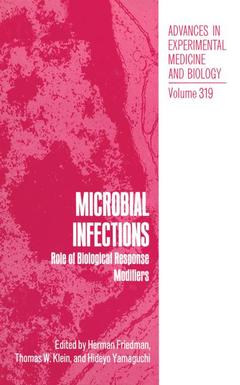Description
Microbial Infections, 1992
Role of Biological Response Modifiers
Advances in Experimental Medicine and Biology Series, Vol. 319
Coordinators: Friedman Herman, Klein Thomas W., Yamaguchi Hideyo
Language: English
Subjects for Microbial Infections:
Publication date: 11-2012
347 p. · 17.8x25.4 cm · Paperback
347 p. · 17.8x25.4 cm · Paperback
Description
/li>Contents
/li>
This volume is based on the Proceedings of the International Conference on "Microbial Infections: Role of Biological Response Modifiers" held in Tampa, FL, May 29-31, 1991. The major purpose of this conference was to bring together in one forum prominent investigators from around the world studying a variety of microbial pathogens, including bacteria, viruses, and fungi, and the effects of biological response modifiers (BRM) on the immune response to these microorganisms. BRM have been widely utilized in the area of antitumor resistance and include not only experimental tumor cell vaccines, but also biologically active substances such as cytokines, i. e. , interferons, tumor necrosis factor, and interleukins, as well as products from bacteria which influence host resistance mechanisms. It is the belief of the organizers of this Conference that it was very timely to discuss in detail BRMs as they impact on microbial infections per se. It is now widely accepted that immunocompromised individuals, including those exposed to immunosuppressive substances such as antimetabolites used for chemothera py of malignancies, or infectious agents, such as the human immunodeficiency virus and other viruses which depress the immune response and, in turn, affect a host so as to become highly susceptible to opportunistic microorganisms, benefit from BRM stimulation of their immune system. A wide variety of immunomodulators are now being studied in terms of treating infectious diseases, as well as malignancy and autoimmune diseases.
Immunomodulatory Drugs of Relevance to the Management of Microbial Infections.- Recent Thoughts on the Immunotherapy of Infectious Diseases Including HIV Infection.- Indentification and Characterization of Mammalian Cell Membrane Receptors for LPS-Endotoxin.- Bacterial Polysaccharides, Endotoxins, and Immunomodulation.- Immunomodulation of C3H/HeJ Cells by Endotoxin Associated Protein and Lipopolysaccharide Endotoxin.- Bacterial Protein-LPS Complexes and Immunomodulation.- Suppression of Antibody Forming Cells by Lipid A Analogs.- BRM Activities of Low-Toxic Bordetella pertussis Lipopolysaccharides.- Interleukin-2 and the Regulation of Activated Macrophage Cytotoxic Activities.- Protective Effects of Cytokines in Murine Salmonellosis.- Legionella pneumophila Infection and Cytokine Production.- Cytokine Activation of Killer Cells in Mycrobacterial Immunity.- T Cell-Monocyte Interactions Induced by Listeria monocytogenes.- Antigen Specific Suppressor T Cells Respond to Cytokines Released by T Cells.- “Inverse” Effects of Cortisone in Experimental Infection of Mice.- Bacterial Cell Surface Biological Response Modifiers and Their Synthetic Counterparts.- Determination of the Antiinfectious Activity of RU 41740 (Biostim) as an Example of an Immunomodulator.- MDP Derivatives and Resistance to Bacterial Infections in Mice.- Therapeutic and Prophylactic Effects of Romurtide Against Experimental Animal Infections.- Enhancement of Host Resistance to Opportunistic Infections by Ubenimex (Bestatin).- Potentiation of Host Resistance Against Microbial Infections by Lentinan and its Related Polysaccharides.- Cytokines and Antifungal Immunity.- Cryptococcal Immunity and Immunostimulation.- Immunomodulators and Fungal Infections: Use of Antifungal Drugs in Combination with G-CSF.-Biologic Response Modifiers as Antivirals in Immunosuppressed Hosts.- Stimulation of Host-Defense Mechanism with Synthetic Adjuvants and Recombinant Cytokines Against Viral Infections in Mice.- ADF (Adult T-Cell Leukemia-Derived Factor)/Human Thioredoxin and Viral Infection: Possible New Therapeutic Approach.- Antiviral and Adjuvant Activity of Immunomodulator Adamantylamide Dipeptide.- Immunomodulation by Medicinal Plants.- Immunomodulating Effects of Polysaccharides from Medicinal Plants.- Effects of Sho-saiko-to on Cytokine Cascade and Arachidonic Acid Cascade.- Effects of Medicinal Plants on Hemopoietic Cells.- Multiple Immunological Functions of Extracts from the Cone of Japanese White Pine, Pinus parviflora Sieb, et Zucc.- Biological Response Modifiers in Infectious Diseases: Prospectives for the Future.
© 2024 LAVOISIER S.A.S.




